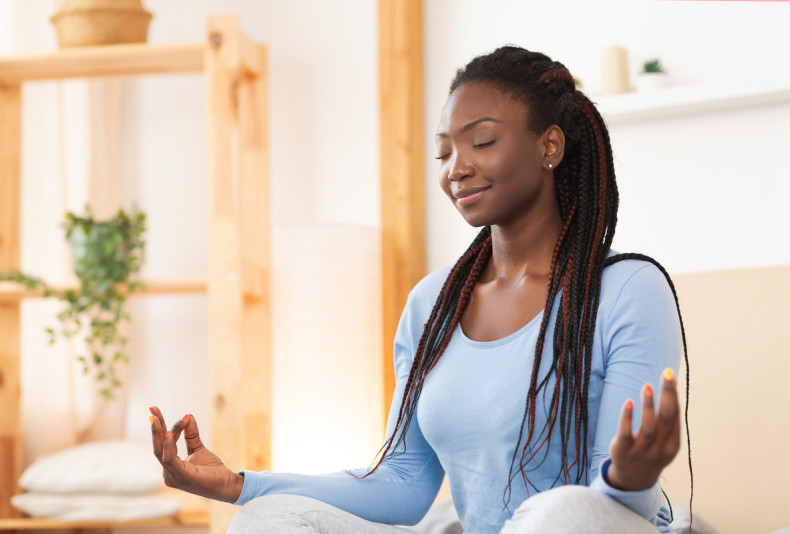Most people don’t notice their heartbeat during their day-to-day life, but if you suffer from heart palpitations your heartbeat will become uncomfortably obvious. It’s possible to experience heart palpitations at any time, but many people experience them more often at night.
What are heart palpitations?
“Heart palpitations are the sensation of being aware of your heart beating. They are a common condition and not usually a serious cause for concern.”
“It may feel like your heart is pounding, fluttering, beating irregularly, or beating faster,” explains consultant cardiologist, Dr Mumin Noor.
The feeling can last from a few seconds to a few minutes. This sensation can be strange or uncomfortable and may also be felt in your chest and neck.
In many cases, heart palpitations are harmless, but they can sometimes indicate a heart condition which needs treatment, like an irregular heartbeat (arrhythmia).
Why do I get heart palpitations at night?
You might find that you experience heart palpitations more often at night because you are lying down. The reason some people have heart palpitations when lying down could be due to how pressure builds up in the body when in bed.
“It is understood that people who sleep on their side – in particular on their left side – could be more likely to have heart palpitations at night. Because the heart is next to the chest wall, the sensation can reverberate more strongly in this position,” explains Dr Mumin Noor.
Another reason you might get heart palpitations when you are trying to sleep is the environment. There are typically fewer distractions and less noise when we go to sleep at night, and for this reason, you might be more aware of your heartbeat. In general, heart palpitations at night come and go, and are usually harmless.
Symptoms of heart palpitations
The symptoms of heart palpitations may include your heart:
- beating faster than normal
- pounding
- skipping beats
- beating irregularly
If any of these symptoms are accompanied by other symptoms such as shortness of breath, fainting, chest pain or feeling lightheaded, then you should seek medical assistance as soon as possible as this could be an indication of something more serious.
What causes heart palpitations at night?
Heart palpitations at night can be caused by:
- the position you are sleeping in
- anxiety
- stress
- certain medications
- an electrolyte imbalance
- dehydration
- fever
- hormonal changes (such as during pregnancy, menstruation and before menopause)
Heart palpitations at night may also be caused by health conditions such as:
- abnormal heart rhythm (arrhythmias)
- low blood sugar level (hypoglycaemia)
- low blood pressure (hypotension)
- thyroid disease
- anaemia
- heart disease
- structural heart problems
- metabolic syndrome
How to calm heart palpitations at night
If you suffer from frequent heart palpitations during the day or at night, you should contact a medical professional like your GP or a cardiologist to get a diagnosis. In the meantime, there are a range of ways in which you can manage your heart palpitations at night, such as controlled breathing and breathing deeply.
For this purpose, you may wish to incorporate relaxation techniques such as meditation. You can also try drinking a glass of water, getting up and walking around for a while, or changing your sleeping position.
How to prevent heart palpitations at night
“To prevent heart palpitations at night, there are a range of things you can do that might help. Avoid drinking too many alcoholic or caffeinated drinks, especially before bed. Don’t eat a big meal before bed, as it may be harder to sleep due to your body working to digest the food. If you suffer from anxiety or depression, seek treatment; therapy or medication could help you to sleep better at night,” explains Dr Mumin Noor.
Reducing your stress levels can also help you to sleep and prevent heart palpitations. You can do this in several ways, including maintaining a healthy work/life balance, and practising calming techniques such as meditation and controlled breathing. Your sleep can also benefit from maintaining a healthy weight (research has shown that obese people are more likely to report insomnia) and sticking to a balanced diet.

Meditation can be a great way to reduce stress levels and combat heart palpitations at night.
Heart palpitations treatment
If you suffer from frequent heart palpitations at night, you should contact a medical professional for a diagnosis. They may be able to identify the cause of your heart palpitations and recommend the best treatment based on your individual needs. Your doctor will be best placed to advise on the best lifestyle and home remedies, allowing you to treat palpitations at home.
Medications can help to reduce heart palpitations and slow your heart rate. Depending on the cause of your heart palpitations, you may be prescribed medication such as beta blockers and calcium channel blockers. When heart palpitations are caused by arrhythmia such as atrial fibrillation, cardiac ablation may be the appropriate treatment.
For more information or to book an appointment, please contact our customer care team.
Related content
-
Atrial fibrillation
Atrial fibrillation is a heart rhythm disorder where your heart beats irregularly, either too fast or too slow. Learn about how our cardiology specialists can treat it.
-
Arrhythmia (abnormal heart rhythm)
Arrhythmia is an abnormal heart rhythm, where the heart’s normal rhythm is disrupted.
-
Cardiology
Our specialists are continuously innovating in minimally invasive cardiology procedures and improving care delivery.
